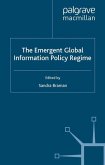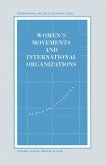There is a struggle over governance of the global information network among national governments and international organizations, corporations and NGOs, elites and civil society. The outcome will determine how we communicate, the extent of our civil liberties and human rights, the profitability of e-commerce, and the richness of cultural expression. This collection looks at the processes by which the global information policy regime is being formed - themselves in conflict - as a foundation for understanding its emergent features.
Hinweis: Dieser Artikel kann nur an eine deutsche Lieferadresse ausgeliefert werden.
Hinweis: Dieser Artikel kann nur an eine deutsche Lieferadresse ausgeliefert werden.
'This excellent collection of papers tackles the difficult problems of forging a new governance regime for the producers and users of the Internet. The contributors document the contested emergence of a new regime based on their extensive knowledge of recent developments in the technical, regulatory, legal, economic and social control of the Internet. The book is especially strong on conceptual tools and provides much needed empirical evidence to assist our understanding of the changing character of the information landscape in which we increasingly find ourselves living.' - Robin Mansell, Dixons Chair in New Media and the Internet, The London School of Economics and Political Science
'Professor Braman has managed successfully in explaining the emergence of a new global information policy regime through the innovative use of regime theory. The selection of scholars provide for unique and comprehensive insights in the procedural and substantive challenges that underpin the development of international policy regimes. In particular Sandra Braman's own analysis and operationalization of the emerging fields is extremely valuable to conceptualize the lead trends and responses. A must-read for every scholar, policy maker and advocate who cares about how information policy is being determined at the global level.' - Stefaan Verhulst, Chief of Research, The Markle Foundation
'The governance and regulation of information and communication
technologies, centred on the Internet, will influence the course of
globalization over the coming decade. This collection will help students of
communication law and policy, and from Internet studies to politics and
international relations, to gain an understanding of the ecology of actors
and strategies shaping and constraining the emergence of global governing
structures and processes during a period of rapid transformation.' - William H. Dutton, Director of the Oxford Internet Institute, Professor of Internet Studies at the University of Oxford and Fellow of Balliol College
'Professor Braman has managed successfully in explaining the emergence of a new global information policy regime through the innovative use of regime theory. The selection of scholars provide for unique and comprehensive insights in the procedural and substantive challenges that underpin the development of international policy regimes. In particular Sandra Braman's own analysis and operationalization of the emerging fields is extremely valuable to conceptualize the lead trends and responses. A must-read for every scholar, policy maker and advocate who cares about how information policy is being determined at the global level.' - Stefaan Verhulst, Chief of Research, The Markle Foundation
'The governance and regulation of information and communication
technologies, centred on the Internet, will influence the course of
globalization over the coming decade. This collection will help students of
communication law and policy, and from Internet studies to politics and
international relations, to gain an understanding of the ecology of actors
and strategies shaping and constraining the emergence of global governing
structures and processes during a period of rapid transformation.' - William H. Dutton, Director of the Oxford Internet Institute, Professor of Internet Studies at the University of Oxford and Fellow of Balliol College








